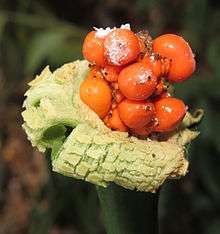Alocasia fornicata
| Alocasia fornicata | |
|---|---|
 | |
| Scientific classification | |
| Kingdom: | Plantae |
| (unranked): | Angiosperms |
| (unranked): | Monocots |
| Order: | Alismatales |
| Family: | Araceae |
| Subfamily: | Aroideae |
| Tribe: | Colocasieae |
| Genus: | Alocasia (Roxb.) Schott |
| Species: | A. fornicata |
| Binomial name | |
| Alocasia fornicata (Kunth) Schott | |
| Synonyms[1] | |
|
Colocasia fornicata Kunth | |
Alocasia fornicata is a plant species of many-nerved, broad-leaved, rhizomatous or tuberous perennials from the family Araceae, native to Indochina and to the Indian Subcontinent.[1] It characteristically grows 2' - 3 ' in height with slightly pink petiole, triangular wide shaped leaves and a horizontally growing stolon.[2][3][4][5]
The plant's spadix is collected and cooked in North East India, Mizoram and Tripura where the plant is known locally as Baibing. Alocasia affinis is also consumed. Both are a much favored seasonal vegetable.
The plant, including the spadix, contains needle-shaped crystals of calcium oxalate known as raphides that are believed to be a defense mechanism against plant predators[6] that can tear and damage the mucus membranes of the throat or esophagus.[7]
References
- 1 2 Kew World Checklist of Selected Plant Families
- ↑ Ara, H. (2001). An Annotated Checklist of Aroids of Bangladesh. Bangladesh Journal of Plant Taxonomy 8(2): 19-34.
- ↑ Govaerts, R. & Frodin, D.G. (2002). World Checklist and Bibliography of Araceae (and Acoraceae): 1-560. The Board of Trustees of the Royal Botanic Gardens, Kew.
- ↑ Boyce, P.C., Sookchaloem, D., Hetterscheid, W.L.A., Gusman, G., Jacobsen, N., Idei, T. & Nguyen, V.D. (2012). Flora of Thailand 11(2): 101-325. The Forest Herbarium, National Park, Wildlife and Plant Conservation Department, Bangkok.
- ↑ Choudhary, R.K., Srivastava, R.C., Das, A.K. & Lee, J. (2012). Floristic diversity assessment and vegetation analysis of Upper Siang district of eastern Himalaya in North East India. Korean Journal of Plant Taxonomy 42: 222-246.
- ↑ Arnott, H.J., M.A, Webb (2000). Twinned Raphides of Calcium Oxalate in Grape (Vitis): Implications for Crystal Stability and Function. International Journal of Plant Sciences 161(1):133–142.
- ↑ Outbreak of Food-borne Illness Associated with Plant Material Containing Raphides. Informa Healthcare.